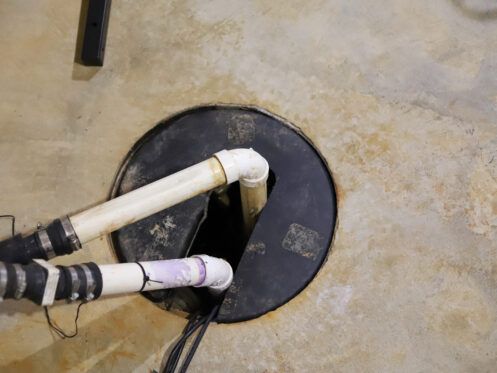A sump pump is a crucial component in preventing basement flooding. Typically installed in a sump pit in the basement or crawlspace, its primary function is to remove excess water that accumulates around the foundation. As soon as the water level starts to increase, the sump pump starts pushing the water out of the structure and into a specific drainage place, such a dry well or storm drain. This helps prevent water damage, mold growth and structural issues caused by groundwater intrusion. Sump pumps are especially vital in areas prone to heavy rainfall, snowmelt or where the water table is high. If you’re wondering whether your home could benefit from a sump pump, check out the different types and the top reasons for using them.
What Are the Different Types of Sump Pumps?
Submersible and pedestal sump pumps are the two most common varieties. Submersible pumps are less noisy and less noticeable since technicians install them directly in the sump pit, meaning they usually stay immersed in water. Pedestal pumps mount the motor above the pit, making them simpler to maintain. However, they tend to be louder than other types of pumps. In the event of a power loss, there are backup sump pumps that run on batteries. The most thorough defense is a combination system that uses both main and backup pumps. Some considerations for selecting a sump pump are the basement’s design, your available funds and the home’s potential for flooding.
1. Prevents Basement Flooding
Using a sump pump is crucial for preventing basement flooding as it actively manages excess water accumulation. During heavy rains or snowmelt, groundwater can seep into the basement, posing a serious threat to the foundation and belongings. A sump pump efficiently redirects this water away from the home’s foundation, mitigating the risk of structural damage, mold growth and potential loss of property. By promptly removing water from the sump pit, it ensures a dry and secure basement environment, offering homeowners peace of mind and safeguarding their investment against the costly repercussions of water damage.
2. Reduces Mold and Mildew
A sump pump works around the clock to avoid standing water in the basement, which is a key component in keeping mold and mildew at bay. Basements are breeding grounds for mold and mildew when water seeps in from underground. By quickly eliminating water from the sump pit, the pump reduces humidity, which in turn further reduces the likelihood of mold growth. Doing so is critical to avoiding mold-related respiratory problems.
3. Preserves the Home’s Foundation
By redirecting water away from the foundation, a sump pump prevents soil erosion and minimizes hydrostatic pressure that can lead to cracks or structural damage. This proactive approach ensures a dry environment, reducing the risk of foundation settlement and damage caused by prolonged exposure to moisture.
4. Enhances Indoor Air Quality
By diverting water away from the basement and keeping it from becoming a breeding ground for mold and mildew, a sump pump greatly enhances the quality of air within a home. The sump pump plays a major role in keeping things dry, which is good for people’s respiratory health. Humidity reduction also helps HVAC systems last longer and work more efficiently.
5. Protects Your Belongings
A sump pump is crucial for protecting a homeowner’s belongings by preventing basement flooding. When heavy rains or water seepage threaten, the pump swiftly removes excess water, minimizing the risk of damage to any stored items. This proactive approach safeguards valuables such as furniture, electronics and sentimental possessions from the destructive effects of water exposure. Beyond material losses, preventing damage to belongings preserves the emotional and financial investments homeowners have made in their homes.
6. Prevents Electrical Damage
In the case of a flooded basement, a sump pump will divert water away from the electrical systems, protecting them from harm. Electrical components are particularly vulnerable to water damage, which can cause corrosion, short circuits and even fires. The sump pump aids in avoiding these dangers and maintaining the functioning and integrity of the electrical systems by quickly extracting water from the basement. Preventing expensive repairs, ensuring a constant power supply and protecting inhabitants all depend on this protection.
7. Mitigates Radon Gas
A sump pump can help mitigate radon gas by controlling moisture levels in the basement. Radon is a naturally occurring radioactive gas that can seep into homes through the soil. Excess moisture in the soil exacerbates radon infiltration. By actively managing water accumulation, the sump pump minimizes the conditions favorable for radon migration. This is crucial because prolonged exposure to radon is a significant health risk linked to lung cancer. Therefore, a well-functioning sump pump not only prevents water damage but also contributes to a healthier indoor environment by reducing the potential for radon gas infiltration and associated health risks.
8. Increases Home Value
A sump pump can increase a home’s value by safeguarding it against water damage, mold issues and foundation problems. While the direct financial impact varies from one home to the next, a well-maintained sump pump contributes to a dry and secure basement, making the property more attractive to potential buyers. Homebuyers often prioritize features that protect against potential hazards, and a functional sump pump enhances the overall appeal and marketability of a home. Ultimately, the investment in a sump pump not only safeguards the property but can also yield a return on investment by enhancing the home’s market value.
9. Decreases Pest Infestations
A sump pump keeps the basement dry, which helps keep pests out of the house. Insects and other pests that love wet environments, such as mosquitoes and termites, are drawn to areas with an excess of moisture. By quickly draining the area, the sump pump removes a breeding ground for pests. Pests are a major health risk, a potential source of structural damage and an annoyance to everyone who spends any amount of time in their house. Insects and other pests can cause serious problems for homes and their occupants, so installing a sump pump is a good first step in keeping your property safe and healthy.
10. Decreases Insurance Costs
As a preventative step against water damage, installing a sump pump might result in lower insurance costs. Because sump pumps and other preventative measures lessen the likelihood of expensive claims caused by flooding or water damage, insurance companies often grant discounts to homeowners who install them. Being able to show that you did everything to protect your home by installing a sump pump can also make it easier to get approval for a claim.
Now that you understand the benefits of installing a sump pump, it’s time to pick a company to work with. Many Temecula homeowners use We Care Plumbing, Heating and Air to handle all of their sump pump installation and repair needs. We also help homeowners with heating, cooling and plumbing services. Contact We Care Plumbing, Heating and Air now to speak with a licensed technician about using a sump pump in your home.







